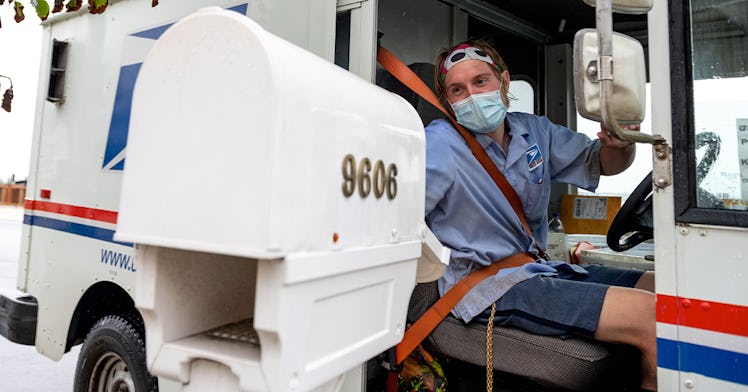The War Against the Post Office Started a Long Time Ago
The USPS crisis has origins in the Bush era. So that's nice.

Over the past few weeks, numerous reports about the United States Postal Service tearing out mail collection boxes, throwing out automatic mail sorters, and locking up existing mail collection boxes so no one can put their mail in it have rocked the nation. For many, including lawmakers, policy analysts, and reporters, it’s clear that the dismantling of the government service that is embedded in the constitution has at least a little bit to do with the upcoming November election, and suppressing the right to vote by mail. After all, as a result of these actions, at least 46 states are in danger of having ballots not delivered by deadline and, as a result, having millions of ballots thrown out completely.
In the midst of the escalating crisis, House Democrats have called themselves from summer recess early to call Postmaster General Louis DeJoy, a Trump ally who has engaged in serious budget cuts to the postal service over the last few months, to question him on August 24 ahead of the election. But is this crisis new? And should voters worry about it? Here’s what you need to know.
The USPS Asked for a Bail-Out Four Months Ago
In the midst of the COVID-19 crisis, the USPS asked Congress for a $75 billion bailout as a result of decreasing revenue amid the COVID-19 crisis. The calls went at least somewhat answered in a Democratic stimulus bill which Trump refuses to pass because — and this is a direct quote — “They need that money in order to make the Post Office work, so it can take all of these millions and millions of ballots. If they don’t get those two items, that means you can’t have universal mail-in voting, because they’re not equipped.”
So, that’s the game. Trump won’t sign a stimulus bill with USPS funding to help it. He does not want votes to be counted. He does not want it to 1) survive increased service due to a pandemic where everyone is ordering everything by mail and 2) to be equipped for the increase in mail-in voting in a year when a deadly pandemic requires as few congregations of people in any space as possible.
The Postal Service Crisis Began in 2006
Alex Shepard of The New Republic points out that in 2006, the Postal Service Accountability and Enhancement Act introduced by Representative Tom Davis (a Republican) was passed. The bill put a host of regulations and requirements on the Postal Service that no other federal institution has had to comply with — namely, that the USPS had to fully fund its pension program for up to 75 years into the future. This was obviously costly — and obviously unheard of. Still, the bill passed, the USPS was required to somehow come up with $72 billion, and the USPS budget basically became immediately unprofitable. Not that profit should matter for a government service, as it is not a business — but the reality is that without the Act, the USPS would be profitable today, and because of it, anti-USPS-ers can call the service inefficient, bloated, and fiscally irresponsible, rather than one that was sabotaged 14 years ago.
Postmaster General Louis DeJoy Is Only Continuing The Work
It’s important to note, however, that Trump alone is not responsible for the USPS crisis. Although he did appoint Louis DeJoy, a wholly unqualified major Trump donor, who basically immediately rolled up his sleeves to gut the service that is mandated in the constitution. But DeJoy didn’t begin this bizarre work.
In reality, the problems with the USPS today have been a long time coming — they’ve basically been in the works since 2006.
If You’re Concerned About Mail-in Voting, 41 States Have Early Voting
Unfortunately, many voters are obviously concerned about the efficacy of mail-in voting after the USPS warned 46 states that they would potentially have massive delays in the ability to count ballots, and could likely end up throwing out ballots due to mail delays.
That being said, 41 states offer early voting. This isn’t the same as mail-in or absentee voting, but it does provide voters with an opportunity to cast their ballots without waiting in line for hours, therefore limiting risk of contracting COVID-19 and avoiding the uncertainty of mail-in voting, which may be all but assured if Trump gets his way to dismantle the USPS.